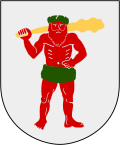Lapland, Sweden
| Lappland | ||
|---|---|---|
|
||
 |
||
| Country | Sweden | |
| Land | Norrland | |
| Counties |
Västerbotten County Norrbotten County Jämtland County |
|
| Area | ||
| • Total | 109,702 km2 (42,356 sq mi) | |
| Population (2009) | ||
| • Total | 94,350 | |
| • Density | 0.86/km2 (2.2/sq mi) | |
| Ethnicity | ||
| • Language | Swedish, Sami | |
| Culture | ||
| • Flower | Mountain avens | |
| • Animal | Arctic fox | |
| • Bird | Bluethroat | |
| • Fish | Salvelinus | |
| Time zone | CET (UTC+1) | |
| • Summer (DST) | CEST (UTC+2) | |
Lappland, often Anglicized as Lapland (Swedish: Lappland, Latin: Lapponia, Northern Sami: Sápmi), is a province in northernmost Sweden. It borders Jämtland, Ångermanland, Västerbotten, Norrbotten, Norway and Finland. About a quarter of Sweden's surface area is in Lappland.
Lappland originally extended eastward. However, in 1809 the Russian Empire annexed the eastern part of the Swedish realm, and created the Grand Duchy of Finland, which in effect split Lappland into a Swedish part and a Finnish part, both of which still exist today.
The traditional provinces of Sweden serve no administrative or political purposes but are cultural and historical entities. Administratively, Lappland constitutes the western part of two counties of Sweden, Norrbotten County in the north and Västerbotten County in the south. In contrast to most other areas of Sweden, there is more of an identification with the counties rather than to provinces. Thus, most people in these counties refer to the entire county, including the areas in Lappland, when they say 'Norrbotten' or 'Västerbotten'.
Citizens of Sami descent are eligible to stand and vote in elections for the Swedish Sami Parliament, which is the case with Sami people elsewhere in Sweden as well. Sami language has an official minority status in Kiruna Municipality, Gällivare Municipality, Jokkmokk Municipality and Arjeplog Municipality.
...
Wikipedia

